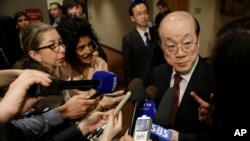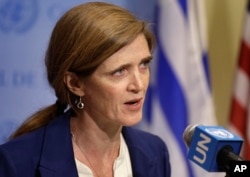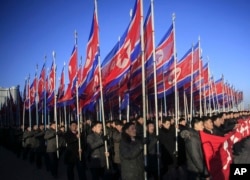The United States and its allies are pushing members of the U.N. Security Council for a swift vote on a draft resolution placing further sanctions on North Korea - sanctions that would make all exported cargo subject to inspection and halt imports of all products that could be used for military purposes.
U.S. Ambassador to the United Nations Samantha Power presented the resolution Thursday after seven weeks of negotiations between the United States and China, North Korea's closest ally.
China has supported dialogue about sanctions on North Korea in the past, but the new resolution has Chinese support on measures such as banning the North Korean import of aviation products and rocket fuel, and any items that could be used by the military, such as trucks and small arms.
China's Ambassador Liu Jieyi made clear to reporters Thursday after the U.N. Security Council meeting that China is working closely with other Security Council members to achieve North Korean denuclearization, and added he hopes the resolution will result in "peace and stability."
Despite China's policy shift on North Korea, the resolution still faces some obstacles, such as Russia's declaration that it will need to study the document over the next few days, stalling a vote on the resolution until next week. Russian Ambassador Petr Iliichev told reporters the resolution's myriad details warrant careful study before Russia takes a position.
The new draft resolution is a response to North Korea's January nuclear test and February rocket launch. The two events violated four sets of existing international sanctions imposed on Pyongyang’s nuclear and ballistic missile program.
“These sanctions, if adopted, would send an unambiguous and unyielding message to the DPRK regime: The world will not accept your proliferation. There will be consequences for your actions. And we will work relentlessly and collectively to stop your nuclear program,” Power told reporters after discussing the draft with council members.
Weapons, fuel trade
One new measure is an embargo on all arms — conventional and otherwise — in and out of North Korea.
“In addition to being destabilizing, we know it is the conventional arms program that also generates revenue through exports for Pyongyang’s illicit programs,” a U.S. official familiar with the draft said.
The resolution also seeks to impose a mandatory inspection of all cargo, even food, going into or out of the rogue nation, whether it moves by land, sea or air. The official said this move was “unprecedented.”
The official said the resolution also targets North Korea’s shadowy underground nuclear proliferation networks. Measures in the draft would require states to expel North Korean diplomats involved in illicit activities, as well as to close the offices and kick out the representatives of big DPRK companies that are involved in activities subject to U.N. sanctions.
For the first time, there would also be sanctions banning the supply or transfer of aviation fuel — a specialized, highly refined petroleum-based fuel used for both civilian planes and rockets.
The U.S. official said there would be no exemption to that ban for civil aviation.
North Korea operates a national airline, Air Koryo, and the fuel sanctions could affect its ability to fly.
Power said the resolution would also impose restrictions “limiting — and in some instances banning outright — exports from the DPRK of coal, iron, gold, titanium and rare earth minerals.”
Banks, luxury goods
North Korea has been under tough financial sanctions for some time, but the new resolution would seek to tighten those measures, requiring states to close North Korean bank accounts in their financial institutions and prohibiting engagement with North Korean banks.
DPRK leader Kim Jong Un’s fondness for luxury goods is well-known. Previous council resolutions have cracked down on the import of expensive cars, liquor and other items to North Korea, but enforcement has been difficult.
The new resolution seeks to clarify what a “luxury” item is, and fancy watches, lead crystal, personal watercraft and snowmobiles valued at more than $2,000 dollars reportedly would be prohibited.
Power said that if adopted, these sanctions “would break new ground and represent the strongest set of sanctions imposed by the Security Council in more than two decades.”
Resistance unlikely
The resolution is unlikely to meet any significant resistance in the council since China, Pyongyang’s closest ally, has agreed to the language.
“I am very pleased that we have come to this stage. I hope all the members of the Security Council will agree with the text,” said Japan’s U.N. ambassador, Motohide Yoshikawa.
French Ambassador François Delattre told reporters the new sanctions were needed “to break the irresponsible behavior” of Pyongyang and “bring them back to the negotiation table.”
According to diplomats, the resolution does have language reaffirming the importance of resuming the six-party talks, which are aimed at ending Pyongyang’s nuclear program through diplomatic negotiations. China, Japan, North Korea, Russia, South Korea and the United States are the participants in the talks.






